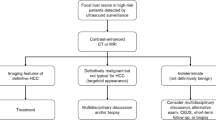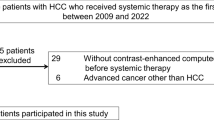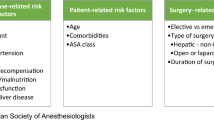Abstract
Background
Systemic inflammation can promote tumor growth. The Glasgow Prognostic Score (GPS), a simple assessment of systemic inflammation status, could be useful to predict the prognosis of hepatocellular carcinoma (HCC) patients after hepatectomy.
Methods
Consecutive HCC patients were enrolled following hepatectomy at our institution between 2005 and 2012. Univariate and multivariate analyses were performed to identify variables associated with overall survival (OS) and recurrence-free survival. Patients were stratified according to the GPS. To minimize selection bias, propensity score analysis was performed.
Results
An elevated GPS (1–2), des-gamma carboxyprothrombin levels (≥40 mAU/mL), and the presence of multiple tumors were significantly associated with a poor OS. Alpha-fetoprotein levels (≥20.0 ng/mL), des-gamma carboxyprothrombin levels (≥40 mAU/mL), and the presence of multiple tumors were independent risk factors for a poor recurrence-free survival. After one-to-one matching, 92 patients each with a normal GPS (0) and an elevated GPS (1–2) had similar preoperative and operative characteristics. Poorer OS times in patients with an elevated GPS were confirmed by excluding possible misinterpretation.
Conclusions
An elevated GPS was an independent prognostic indicator for OS after hepatectomy in HCC patients. The GPS, which employs inexpensive and readily available biomarkers, could be a novel tool for predicting survival in such patients.



Similar content being viewed by others
References
Diakos CI, Charles KA, McMillan DC et al (2014) Cancer-related inflammation and treatment effectiveness. Lancet Oncol 15:e493–e503
Mantovani A, Allavena P, Sica A et al (2008) Cancer-related inflammation. Nature 454:436–444
Tilg H, Wilmer A, Vogel W et al (1992) Serum levels of cytokines in chronic liver diseases. Gastroenterology 103:264–274
Ji J, Shi J, Budhu A et al (2009) MicroRNA expression, survival, and response to interferon in liver cancer. N Engl J Med 361:1437–1447
Nagaoka S, Yoshida T, Akiyoshi J et al (2007) Serum C-reactive protein levels predict survival in hepatocellular carcinoma. Liver Int 27:1091–1097
Fujiwara H, Suchi K, Okamura S et al (2011) Elevated serum CRP levels after induction chemoradiotherapy reflect poor treatment response in association with IL-6 in serum and local tumor site in patients with advanced esophageal cancer. J Surg Oncol 103:62–68
Kelly L, White S, Stone PC (2007) The B12/CRP index as a simple prognostic indicator in patients with advanced cancer: a confirmatory study. Ann Oncol 18:1395–1399
Adachi T, Hinoi T, Hattori M et al (2015) The modified Glasgow prognostic score for early mortality in patients with synchronous peritoneal carcinomatosis from colorectal cancer. Surg Today 45:1396–1403
Mano Y, Shirabe K, Yamashita Y et al (2013) Preoperative neutrophil-to-lymphocyte ratio is a predictor of survival after hepatectomy for hepatocellular carcinoma: a retrospective analysis. Ann Surg 258:301–305
Harimoto N, Shirabe K, Nakagawara H et al (2013) Prognostic factors affecting survival at recurrence of hepatocellular carcinoma after living-donor liver transplantation: with special reference to neutrophil/lymphocyte ratio. Transplantation 96:1008–1012
Nakagawa K, Tanaka K, Nojiri K et al (2014) The modified Glasgow prognostic score as a predictor of survival after hepatectomy for colorectal liver metastases. Ann Surg Oncol 21:1711–1718
Poon RT, Fan ST, Lo CM et al (2002) Long-term survival and pattern of recurrence after resection of small hepatocellular carcinoma in patients with preserved liver function: implications for a strategy of salvage transplantation. Ann Surg 235:373–382
Forner A, Llovet JM, Bruix J (2012) Hepatocellular carcinoma. Lancet 379:1245–1255
Itamoto T, Nakahara H, Amano H et al (2007) Repeat hepatectomy for recurrent hepatocellular carcinoma. Surgery 141:589–597
Voron T, Tselikas L, Pietrasz D et al (2015) Sarcopenia impacts on short- and long-term results of hepatectomy for hepatocellular carcinoma. Ann Surg 261:1173–1183
Harimoto N, Shirabe K, Yamashita YI et al (2013) Sarcopenia as a predictor of prognosis in patients following hepatectomy for hepatocellular carcinoma. Br J Surg 100:1523–1530
Oishi K, Itamoto T, Kobayashi T et al (2009) Hepatectomy for hepatocellular carcinoma in elderly patients aged 75 years or more. J Gastrointest Surg 13:695–701
Ishizuka M, Kubota K, Kita J et al (2011) Usefulness of a modified inflammation-based prognostic system for predicting postoperative mortality of patients undergoing surgery for primary hepatocellular carcinoma. J Surg Oncol 103:801–806
Huang J, Xu L, Luo Y et al (2014) The inflammation-based scores to predict prognosis of patients with hepatocellular carcinoma after hepatectomy. Med Oncol 31:883
Kinoshita A, Onoda H, Imai N et al (2013) The Glasgow Prognostic Score, an inflammation based prognostic score, predicts survival in patients with hepatocellular carcinoma. BMC Cancer 13:52
Horino K, Beppu T, Kuroki H et al (2013) Glasgow Prognostic Score as a useful prognostic factor after hepatectomy for hepatocellular carcinoma. Int J Clin Oncol 18:829–838
Itamoto T, Nakahara H, Tashiro H et al (2005) Indications of partial hepatectomy for transplantable hepatocellular carcinoma with compensated cirrhosis. Am J Surg 189:167–172
Liver Cancer Study Group of Japan (2008) General rules for the clinical and pathological study of primary liver cancer, 5th edn. Kanehara, Tokyo
Proctor MJ, Talwar D, Balmar SM et al (2010) The relationship between the presence and site of cancer, an inflammation-based prognostic score and biochemical parameters. Initial results of the Glasgow Inflammation Outcome Study. Br J Cancer 103:870–876
Roxburgh CS, Crozier JE, Maxwell F et al (2009) Comparison of tumour-based (Petersen Index) and inflammation-based (Glasgow Prognostic Score) scoring systems in patients undergoing curative resection for colon cancer. Br J Cancer 100:701–706
Abe T, Tashiro H, Hattori M et al (2016) Prediction of long-term survival by using the Glasgow Prognostic Score in patients with hepatocellular carcinoma after liver transplantation. Hepatol Res 46:622–633
Shafique K, Proctor MJ, McMillan DC et al (2013) The modified Glasgow prognostic score in prostate cancer: results from a retrospective clinical series of 744 patients. BMC Cancer 13:292
Johnson PJ, Berhane S, Kagebayashi C et al (2015) Assessment of liver function in patients with hepatocellular carcinoma: a new evidence-based approach-the ALBI grade. J Clin Oncol 33:550–558
Acknowledgements
We wish to thank the Center of Life Science, Hiroshima University (Hiroshima, Japan) for the use of their facilities.
Author information
Authors and Affiliations
Corresponding author
Ethics declarations
Conflict of interest
The authors declare that they have no actual or potential conflicts of interests.
Additional information
An erratum to this article is available at http://dx.doi.org/10.1007/s00268-017-3914-x.
Electronic supplementary material
Below is the link to the electronic supplementary material.
Rights and permissions
About this article
Cite this article
Abe, T., Tashiro, H., Kobayashi, T. et al. Glasgow Prognostic Score and Prognosis After Hepatectomy for Hepatocellular Carcinoma. World J Surg 41, 1860–1870 (2017). https://doi.org/10.1007/s00268-017-3909-7
Published:
Issue Date:
DOI: https://doi.org/10.1007/s00268-017-3909-7




